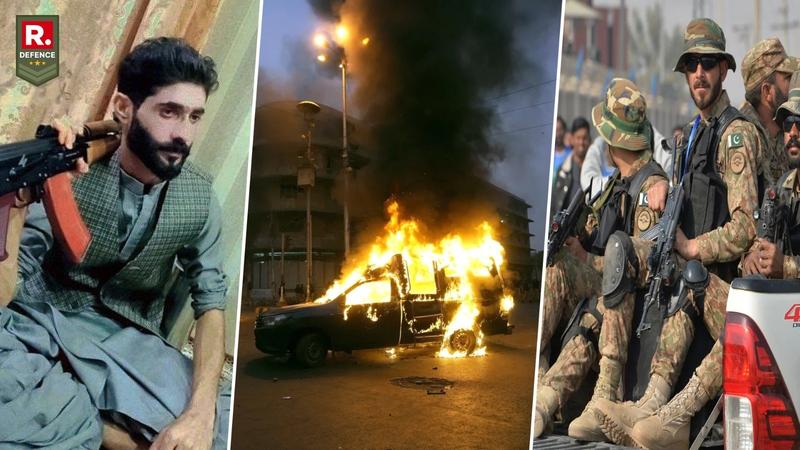Published 19:04 IST, November 12th 2024
BLA and BLF Intensify Separatist Offensive, MI Agent Assassinated, Military Posts Attacked
The Baloch Liberation Army (BLA) claimed responsibility for killing Dashti Khan, an alleged operative of Pakistan’s Military Intelligence (MI), in Quetta.

Quetta, Balochistan - In an intense escalation of separatist violence in Pakistan ’s Balochistan province, the Baloch Liberation Army (BLA) claimed responsibility for killing Dashti Khan, an alleged operative linked to Pakistan’s Military Intelligence (MI), in Quetta. According to a media statement by BLA spokesperson Jeeyand Baloch on Monday, the assassination took place the previous night. “Our fighters shot and neutralized Dashti Khan, an agent and operative of the Pakistani army’s secret agency, Military Intelligence (MI), in Quetta,” he stated. This targeted killing marks a continuation of the BLA’s campaign against Pakistani state forces and their local affiliates.

The BLA accused Dashti Khan, a resident of Saryab, of active collaboration with Pakistan's intelligence services, including the Counter-Terrorism Department (CTD), an elite unit responsible for counter-terrorism, intelligence-gathering, and investigations across Pakistan’s provinces. Allegedly, Khan was involved with state-supported “death squads” and had a role in the enforced disappearances and extrajudicial killings of Baloch youth. According to the BLA, Khan was sentenced to death by a so-called "Baloch National Court" and was subsequently “executed” to fulfill this verdict.
Rise in Separatist Attacks: BLF Assault on Pakistani Checkpoint
On Sunday, the Balochistan Liberation Front (BLF), another freedom group, launched an assault on a Pakistani military checkpoint in Noshki’s Zareen forest. BLF spokesperson Major Gwahram Baloch confirmed that two Pakistani personnel were killed and four others injured in the 20-minute attack involving “heavy, modern weapons.” The BLF, a faction advocating for Baloch independence, also executed multiple attacks on Pakistani military convoys in Kolwah on the same day.

According to the BLF, the first ambush occurred around 12:30 PM in the Marastan area, resulting in the deaths of five soldiers. A second assault followed an hour later near Kadday Hotel, reportedly killing four more soldiers and disabling several vehicles through heavy firepower. In a separate attack in Kharan, BLF fighters targeted a construction site associated with the China-Pakistan Economic Corridor (CPEC), setting machinery ablaze. The group reiterated its opposition to what it described as “imperialist projects” encroaching on Baloch land.
Additional Incidents in Gwadar and Awaran
Further reports of violence emerged from Gwadar, where unidentified assailants attacked a Pakistan Coast Guard patrol between Ormara and Kalmat, injuring three personnel, including a Major. Those wounded—Major Jalaluddin, Tauseef Umar, and Abrar—were treated in Ormara before being transferred to Karachi. No group has claimed responsibility for this assault.
In a separate attack in Awaran, unidentified gunmen assaulted Levies personnel in the Gishkor Hoor area, seizing at least ten firearms. While no casualties were reported, the attack signals increasing unrest and brazen resistance from armed groups operating in the region. So far, no group has taken responsibility for this incident.

Pakistan’s Counter-Terrorism Department (CTD), previously known as the Crime Investigation Department (CID), operates as a multi-functional unit under the jurisdiction of each provincial police force. With responsibilities spanning crime scene investigation, interrogation, anti-terrorism efforts, and intelligence operations, the CTD collaborates with federal intelligence agencies, including the Federal Investigation Agency (FIA) and the Intelligence Bureau (IB). Notably active in Karachi, CTD units work closely with these federal agencies to counter organized crime and dismantle terror cells affiliated with groups such as the TTP, Islamic State, and al-Qaeda. CTD operations are overseen by senior police officials, often Additional Inspector Generals, in coordination with provincial Home Ministries.
The Implications of Increasing Separatist Attacks
The wave of violence orchestrated by Baloch freedom groups highlights the region’s deep-seated grievances against the Pakistani government. The BLA’s recent high-profile assassination of an alleged MI operative underscores the organization’s ability to strike at targets they deem collaborators. Meanwhile, BLF's systematic targeting of military assets, convoys, and CPEC-linked projects reveals an intensified strategy to challenge state control over Balochistan’s vast, resource-rich landscape.
The persistence of these insurgent activities raises significant questions about Pakistan’s internal security framework and the effectiveness of the CTD and other state apparatus in maintaining stability across Balochistan. In recent years, Pakistan has reinforced its military presence and intelligence operations in the province, largely due to the strategic importance of CPEC infrastructure. However, the ongoing violence suggests that local dissent, compounded by allegations of enforced disappearances and human rights abuses, continues to fuel insurgency and challenge state authority.
Updated 19:04 IST, November 12th 2024




